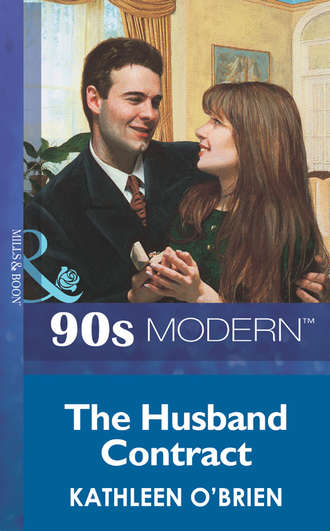
Полная версия
The Husband Contract
She wondered numbly whether Clay would even say he was sorry. Or did he, perhaps, think this was what she deserved? She could only guess what Joshua had told his lawyer about his wild, ungrateful niece.
“Okay.” She put her snow cone down carefully, then met his gaze. “Now is fine.”
“Good.” But Clay didn’t speak right away. His gaze drifted to the next picnic table, where Dutch Allingham and Josh Smithers were forcing bewildered beetles to race down the length of their swords.
The silence stretched. She tried to ignore it, concentrating on wiping her hand with paper napkins. But she noticed that Clay’s forefinger flicked against his thumb, the only sign of perturbation she’d seen in him yet. Perhaps, she thought, he did regret, just a little, what he had to say.
“Toward the end of his life, your uncle insisted on drafting a rather strange new will,” he said slowly, returning his gaze to Melanie’s face. “I hope you’ll take time to think it over carefully before you react. I know it’s going to come as a shock.”
She laughed, and the sound was harsher than she had intended. The boys looked up from their beetle race and stared. “I doubt it. I knew my uncle very well.”
“So did L”
“Did you really?” She eyed him coldly. “Did you live with him for eight years, dependent on him for every scrap of food you ate, every stitch of clothing you wore, every smile, every hug, every bit of affection you received?”
“No.” He frowned. “Of course not”
“Then I don’t believe you knew him quite well enough,” she said. “Otherwise there wouldn’t be a single controlling, vindictive thing he could do to surprise you.”
Clay sighed. “Look, Melanie, I’m sorry…”
His voice sounded genuinely regretful, and even that little hint of pity threatened to destroy her hard-won composure.
Bracing herself, she dug her heels into the sand beneath the table and narrowed her eyes.
“Violins aren’t necessary, Mr. Logan. I’ve known since I was sixteen years old that my uncle planned to disinherit me.”
One side of Clay’s mouth—that wide, generous mouth—quirked up. “And you never let yourself hope that Joshua might change his mind?”
“Never,” she lied, though she could see that he knew it wasn’t true. “Never.”
“Then perhaps I’m going to have the pleasure of surprising you after all.” Clay crossed one leg over the other and propped his head against the palm of his hand. He was the picture of languorous ease—darn him. Melanie’s own posture was so tight she could almost hear her muscles humming.
“Well, you can try,” she said, managing what she hoped was a lazy smile, but which felt annoyingly like a sickly one.
“Okay.” He smiled. “Two months before he died, your uncle established what is commonly known as an incentive trust. In that trust, he left everything—his house, his collection of antique maps, his stocks, bonds and cash holdings and, of course, the Browning ruby—to one person.” He eyed her, obviously assessing the impact of his list. “That’s an estate totaling well over twelve million dollars.”
“Left them to—” she swallowed “—to whom?”
Clay twitched one long, lazy forefinger toward Melanie. “To you.”
For a long moment, she didn’t respond. She couldn’t. Her vocal cords had gone slack. Everything? Even the ruby? That wasn’t possible. Joshua had said—
“There are certain conditions, of course.”
Melanie’s numb hands slowly clenched into fists in her lap. Conditions. Of course. Nothing Joshua Browning had ever offered in his life had been unconditional.
“That,” she said, “might have been predicted.”
“Yes, perhaps. But I did warn you. This is where it gets strange.” Clay leaned forward. The sudden movement stirred the air, and the trembling breath she took tasted sickly sweet, like overblown magnolias. “It’s true,” he said. “You are to inherit everything, every single penny, but only if you can, within one year, prove that you are mature enough to handle it”
She stared. “Prove what?”
Clay shrugged. “Apparently Joshua had certain…reservations about some of your life choices. And, as well, he feared that your brother might coerce you into doing something unwise.”
“Nick would?” Her lips twisted. “What? Did Joshua think I might cut up the Romeo Ruby and use it to buy my brother video games?”
Clay didn’t smile. “Or private schools. Designer shoes. Tennis lessons.”
“Twelve million is a lot of tennis lessons,” she snapped.
“Yes, it is,” he answered calmly. “Too many. I think that was Joshua’s point”
She stared at him. How dare he take that superior tone? This was so utterly preposterous, and yet how like Joshua it was! Though Clay made it all sound so pragmatic, Melanie knew that Joshua hadn’t cared a fig what became of the money. He’d just wanted another way to control her, even from beyond the grave.
“Tell me, Mr. Logan. Did my uncle have any idea how a person can prove anything as intangible as good judgment? Surely maturity can’t be quantified.”
Clay didn’t look at all disturbed by her bitterness. “Actually Joshua suggested several ways. He thought a review of your finances might help, combined with a look at Nick’s grades, interviews with his teachers, things like that But in addition he said that, in his opinion, the ideal proof would be for you to marry someone the executor approved of. Someone who couldn’t be suspected of marrying you for your inheritance.”
Marry her for the money…Had Joshua really said that? Had he really still needed to throw that in her face? Memories of that long-ago night, of an elopement that failed, a love that was proven false, flooded over Melanie like a river of shame.
“Oh, that’s rich! I must marry to get my inheritance? For God’s sake! That’s…that’s…” Realizing she was in danger of sputtering, she took a breath. “That’s positively feudal”
Clay nodded gravely. “So I told Joshua. But he was adamant.”
Suddenly she longed to tell Joshua exactly what she thought of his “incentive trust”. But it was too late. She would never again tell Joshua anything. He was dead. For the first time, it seemed to sink in that her long battle with him was over.
And this…this insult had been his parting message to her.
She stood up though her legs were shaking. She couldn’t listen to another word. Tucking her cardboard helmet under her elbow, she threw her head back, tossing her hair behind her shoulders. She had expected to be hurt, but this… This was worse than anything she had imagined.
“Listen carefully, Mr. Logan,” she said, enunciating each word clearly. “I want you to tell my uncle’s executor, whoever this paragon might be, that I intend to claim my inheritance. The Romeo Ruby belonged to my parents. When they died, my uncle took everything that should have come to us—”
“Their wills named him as beneficiary,” Clay interjected reasonably.
“Perhaps,” she said coldly, “but they meant for him to look after it for us. I’m quite sure it never occurred to my parents that my uncle would try to disinherit Nick and me.”
He waited, not contradicting her. How could he? He must know it was true.
“So you tell my uncle’s executor that I expected something like this. Tell him I’ve already hired a lawyer, and he’s going to break this will.” She narrowed her eyes. “Tell him that I’m not going to lower myself to prove anything to anyone, especially not to any man who’d participate in such a contemptible charade as this.”
Clay was smiling, a strangely charming, lopsided grin that created a small dimple where his cheek met his jaw. She scowled at him. What the devil was so funny?
“I mean it, Mr. Logan. If a snake like that thinks he can actually pass judgment on my life, my decisions, my maturity…”
Her words faltered as a sudden suspicion settled cold and thick in her stomach. She folded her arms across her waist and tried not to shiver.
“All right, I’ll bite. Why the smile? Who’s the executor? Just who is low enough to be my uncle’s accomplice in this farce?”
Clay tilted his head. A ray of sunlight fingered its way through the trees and struck golden highlights into his hair. He was still smiling, his cheek still dimpling.
“I’m sorry, Melanie,” he said quietly. “It’s me.”
CHAPTER TWO
“OH, BLAST all!” Melanie balefully eyed the charred bread sticks on the pan in front of her. “Just look at this,” she said, raising her voice so that it could be heard in the adjacent living room. “I burned them. Damn that man!”
Ted Martin, who was spread out comfortably on her sofa watching a basketball game on television, lifted his blond head. “Who?”
“Clay Logan, of course. Who else?” She picked up one of the blackened twists, which was the consistency of a hockey stick, and knocked it against the counter.
It felt perversely gratifying to hit something. Today had been a very, very bad day. Only forty-eight hours after receiving a copy of Joshua Browning’s will, Melanie’s lawyer had called this afternoon with the tragic news. However medieval it might seem, the will appeared to be ironclad. Clay Logan was too good to have left any loopholes.
Her lawyer had been sympathetic, but the bottom line was that he just couldn’t agree to take the case on a contingency basis—the odds of winning were too slim. His best advice, he said, was that she should negotiate with Logan, who was by all accounts a tough lawyer but a fair and just human being.
Well, not by all accounts. If anyone had asked her, the report would have been a great deal less flattering. She wasn’t ready to agree he was a human being at all.
She whacked the bread stick one last time. “Damn, damn, damn the man. May his grandchildren be cross-eyed. May all his dogs have fleas.”
With a resigned sigh, Ted sat up and turned off the television. “Why? Logan didn’t make you burn the bread, did he?”
She came to the doorway, scowling. “Of course he did.”
“How?” Ted ambled into the kitchen and extracted a fat strawberry from the pie on the windowsill. “Did he break in and sabotage the oven thermostat?”
“He might as well have.” Melanie pulled the strawberry from his fingers just an inch short of his lips. “Honestly, Ted, you’re as bad as Nick.” She tucked the berry back into its cradle of whipped cream. “Now, where was I? Oh, yes—I curse Clay Logan and all his dogs because he’s an insufferable man, and I hate him. I’m so busy hating him, in fact, that I’ve ruined a perfectly good dinner.”
“No, you didn’t. The spaghetti’s fine. And I made one hell of a salad. Let’s eat.”
She wrinkled her nose. “I can’t. I hate Logan too much to eat.”
“Good. More for me.” Ted reached around her to rummage for utensils. “But seriously, are you sure it’s Logan you’re mad at, Mel? He was just the hired gun, wasn’t he? The will itself is your problem—and that was your uncle’s idea.”
“Yeah, I suppose so.” She knew Ted was right, but her annoyance was no less intense for being irrational. She could still see how Logan had looked at the chess match the other day, sizing her up, obviously deciding that Joshua had been right. “But I wish you could have seen his face when he told me. He was the hired gun all right, and he thoroughly enjoyed pulling the trigger.”
“Well, that dirty rat!” Ted’s attempt at a gangster accent failed miserably. “I’ll stab him in the alley like the dog he is.” He tossed silverware nosily. “Or I would if I could find a damn knife.”
Melanie patted his forearm affectionately. Good old Ted—she thanked heaven for his support this past year. It had been a tough year for both of them. Ted’s fiancée had left him last summer, a break that had wounded him more deeply than he liked to acknowledge. And at about the same time, Melanie’s life had been turned upside down by the arrival of her little brother, who had decided he could no longer tolerate living with his domineering Uncle Joshua.
Melanie herself had escaped Uncle Joshua’s tyranny years ago, running away when she was only sixteen, but Nick had stayed with the old man until last year, when their relationship finally grew so stormy that the boy had sought sanctuary with Melanie.
As the dean of boys at Wakefield, Ted had heard about Nick’s change of address immediately and phoned Melanie for a conference. Since then, Ted had become her best friend. She’d rested her woes on his shoulders a hundred times.
And nice shoulders they were, too—trim and solid and warm. She wondered, not for the first time, why their relationship had never blossomed into a romance. Perhaps Ted wasn’t over Sheila yet—Melanie suspected he might never forget his former fiancée. But Melanie didn’t mind. In spite of Ted’s many charms, she had never felt anything more than friendship toward him. No leap of flame. Not even a tiny wriggle of heat.
The sad truth was, she’d felt more sexual awareness watching Clay Logan launder his shirt with his lips today than she ever had here in Ted Martin’s arms.
Yes, life was just a charming little bundle of ironies, wasn’t it?
Still, his big brother comfort was just what she needed now, when her heart was so sore. Who would have guessed she would find her uncle’s death so unnerving? Was it possible she had been harboring hopes of an eventual reconciliation?
Surely not. She might be naive, immature, impractical—all the things Joshua had accused her of—but she wasn’t a complete idiot. She’d given up yearning for his love years ago. Now she merely wanted justice.
Still—suddenly she couldn’t bear the memories of her uncle. Joshua, bent over his dusty old maps. Joshua, barking into his cellular telephone. Joshua studying the financial pages. Joshua, completely ignoring the little girl waiting in the doorway.
She caught her breath, stunned by the wave of sorrow that overwhelmed her. Instantly aware, Ted dropped the flatware and wrapped his arms around her gently.
“It’s okay,” he said, his voice low and steady. “It’s going to be okay.”
“I know.” She shut her eyes. Ted was right. Everything would work out, love or no love, money or no money. Somehow she and Nick would get through.
“Oh, man, that is so gross.”
Straightening, she looked up to see Nick squatting by the open door of the refrigerator, scrounging irritably through the bowls and bottles.
“What’s gross?” With a smile, she patted Ted’s cheek, extricated herself and hurried to her brother’s side. She peered in at the shelves. “Has something spoiled?”
Nick grimaced and grabbed a cold leg of fried chicken. “Yeah, my appetite,” he said. He stood up, gnawing on the drumstick. “People can see you two through the window, you know. Can’t you save that crap for when I’m gone?”
Melanie slowly closed the refrigerator door before speaking. She hardly knew which transgression to address first “Don’t use that word, Nick,” she began.
But he merely grunted and turned his back to her. He had the remote control in his hand and he flicked on the television.
“And what do you mean, when you’re gone?” she asked, keeping her voice neutral. “Were you planning to go out? It’s a school night, you know. It’s Tuesday.”
“Wow.” Nick didn’t turn around. “News flash. It’s Tuesday.”
Behind her, Melanie felt Ted’s tension snap. She touched his arm, warning him, but it was too late. “Listen, Nick,” he said in the tone he ordinarily reserved for the Wakefield campus, “that’s no way to treat—”
Nick finally looked around. His face was hard, closed in. “Hey, we’re not at school now, okay?” He tossed the stripped chicken bone toward the trash can. It missed by two inches, landing with a disagreeable splat on the linoleum. “You’re not the dean when you’re here, man.”
“Nick! Apologize to Mr. Martin immediately,” Melanie ordered, but her words were almost lost beneath a sudden barrage of honking. Five short, aggressive, obviously impatient blares reverberated into the living room.
The sounds acted on Nick like a starting pistol on a sprinter.
He yanked his grimy baseball cap from the kitchen table and darted for the door.
“Nick.” Melanie’s voice was unyielding.
The boy paused. She could almost see him working to swallow his pride.
Finally he turned to Ted. “Sorry, Mr. Martin,” he said, dragging every syllable out with effort. “I guess I lost my cool there. I really didn’t mean to be so rude.”
Ted still looked ruffled, but he accepted the apology fairly graciously. Melanie breathed a sigh of relief. One more crisis averted. Life with a teenager was like this—all peaks and valleys. Poor Nick seemed to be strapped to a hormonal tiger—and Melanie was whipping along behind, holding the bucking tail, trying to hang on.
“Sorry I was being a pig, Mel,” he said, turning to his sister with an expression so angelic she almost laughed out loud. Who did he think he was kidding? “Figgy and I were going out for a burger. His brother Bash is driving. We’ll be back by nine. Okay?”
“Oh, don’t give me that sad-puppy look, you scamp,” she said, reaching out to touch his dark chestnut hair, so wild and messy, yet so like her own. It was hard to stay angry with Nick. Perhaps it was because she remembered all too well her own defiance at fifteen. Or maybe it was because she and Nick had no one but each other now. “I guess it’s okay,” she said, “assuming you’ve done all your home—”
But Nick didn’t dawdle an instant beyond the “okay.” He was already bolting across the front yard, leaping the small iron gate and racing toward the waiting car.
Melanie followed him out, and even after the roaring muffler faded to silence, she lingered on the porch. In a few seconds, she heard Ted’s footsteps. She tossed him an apologetic smile over her shoulder. “Sorry he was such a creep,” she said. “Must have been a spike in the hormone current.”
Ted chuckled. “If only they’d hurry up and invent a cure for adolescence.”
She sighed her heartfelt agreement, but she didn’t pursue the subject. Nick was gone, taking his raging hormones with him, and she didn’t feel like worrying anymore tonight. Instead she breathed deeply, savoring the peace of the sweet latespring evening. Crickets scratched, maples rustled, and in the distance a dog proclaimed himself lord of all he surveyed.
Wrapping her hand around the front post, Melanie gazed down the narrow street, studying the small, cinder-block houses. In spite of a few questionable neighbors, occasional raucous late-night fights in the house next door, she liked this cozy, unpretentious neighborhood, spotty grass, barking dogs and all. She’d take it over the sterile grandeur of Cartouche Court, Joshua’s personal monument to vulgarity, any day.
“Nick hates it here,” she said suddenly. Ted stirred, but he didn’t jump in with a response. She liked that about Ted. He was a good listener. “Every day when we get in the car to go home, he starts singing. Heigh-ho, heigh-ho, it’s home to the ghetto we go.” Though technically it wasn’t funny, she had to smile, remembering. “It’s too awful. He does it in this simply spine-tingling falsetto.”
“Jeez. That brat really needs a boot in the rear, doesn’t he?”
She shook her head helplessly, still grinning. “I guess he just lived too long with my uncle. Cartouche Court can kind of distort your perspective.”
Ted hesitated a moment, and when he spoke, his tone was only half-teasing. “All right, out with it, Mel. Is this your way of telling me you’re going to go after the inheritance after all? What are you going to do—wed some pillar of the community just so you can restore Nick to the elegance of the Court?”
She tilted a glance up into his kind, intelligent face. Darn. He read her too well. She hadn’t even been sure herself, until just moments ago, what she was going to do.
“A ‘pillar of the community’? Ugh. Sounds like the statue in the town square.” She shivered. “No. I’d never go that far, even for Nick. But surely there’s a way to get our inheritance without resorting to marriage.”
“Oh, yeah? How?”
She hoisted herself up on the porch railing, settling her flowered skirt primly around her knees. “Well…” She drew the syllable out, stalling. “Perhaps I can persuade this executioner—”
“Executor.”
“Whatever.” She folded her hands in her lap. “Persuade this Logan fellow that I’m not quite the hopeless flake Joshua said I was.” She smiled. “I mean, I do pay my bills, keep a clean house and floss twice a day. I haven’t shot anyone lately, and I don’t think anybody knows about that time I doubleparked outside the Saveway.”
Ted’s brown gaze remained skeptical. “Yeah, it sounds easy. But the one thing you’re not factoring in is your—”
“My pride?” She raised her chin. “I may be a bit…independent, but believe it or not, I can humble myself. Occasionally, anyhow.” She bit her lip. “Temporarily.”
“Actually it’s not your pride I’m worried about. It’s…well, to put it frankly, your temper.” He lifted a finger to silence her indignant protest “Come on, you know it would make you crazy to let Logan paw through your receipts, deciding whether you paid too much for spaghetti sauce or underwear. You’re just not the type of woman who submits to nonsense like this.”
She scowled. His speech had the irritating ring of truth. “You could be wrong, you know,” she said haughtily. “You’re the dean of boys, not the Freud of females.”
“Yeah, I could be wrong. But I’m not” He tugged on her ponytail, grinning. “I don’t know exactly what would make you surrender yourself to Clay Logan’s authority—or any other man’s for that matter—but I know what won’t. Twelve million dollars won’t”
But five hours later, when the police called to tell her that Figgy, Bash and Nick were down at the police station, she discovered that Ted was wrong.
Twelve million dollars would.
The weather was gloomy all that Saturday morning. It never quite rained, but the sky was bad-tempered, growling and spitting irritably from the time Melanie woke up until the moment she parked her tiny sedan in the circular driveway of Cartouche Court.
She sat for a moment after turning off the ignition, listening to the crackles and snaps of the old engine as it settled. The noises got weirder every day. Hooking her hands over the steering wheel, she peered up at the mansion. She hadn’t been here in years, but the place looked depressingly the same. Big and boxy, ugly and unwelcoming. She felt a sudden urge to start the engine and go home.
Why was she being such a wimp? She wasn’t an eight-yearold orphan anymore. Climbing out of the car, she adjusted her calf-length navy blue skirt, did a quick button check, then used a forefinger to chase any stray lipstick back within the lines. Everything was where it belonged, she decided—except her heart, which was exhibiting a regrettable tendency to beat rather high in her throat.
She slowly ascended the marble front steps and rang the bell. While she waited, she studied the pseudo-Grecian statues that flanked the double front doors. She’d always found them disturbing—two naked, armless females who appeared to have been frozen midflight as they tned to escape the house. Probably Uncle Joshua’s definition of the perfect woman, Melanie thought. Mute, helpless and hopelessly trapped.
“Morning, ladies,” she said, patting the truncated shoulder of the nearest statue. “I’m back, you see. I thought I had gotten away, but apparently it’s not that easy.” She wrinkled her nose. “I guess I don’t have to tell you about that.”
Suddenly the front door swung open, and Melanie’s mouth went embarrassingly slack. For a minute, it was as if the past sixteen years had never even existed. In spite of her grownup clothes, in spite of the lipstick and the car keys, Melanie was eight years old again, staring up into the sourest face she had ever seen.
“Mrs. Hilliard.” Her voice even sounded like a child’s. She cleared her throat, swallowed, then tried again. “It’s good to see you, Mrs. Hilliard. How have you been?”








